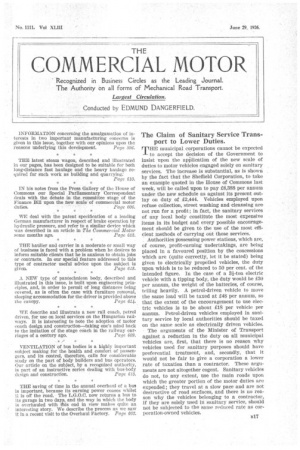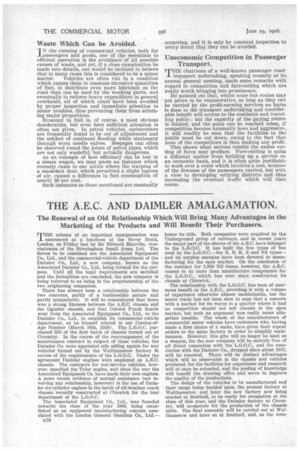The Claim of Sanitary Service Transport to Lower Duties.
Page 1

Page 2

If you've noticed an error in this article please click here to report it so we can fix it.
THE municipal corporations cannot be expected to accept the decision of the Government to insist upon the application of the new stale of duties to motor vehicles engaged solely on sanitary services. The increase is substantial, as is shown by the fact that the Sheffield Corporation, to take an example quoted in the House of Commons last week, will be called upon to pay £8,388 per annum under the new schedule as against its present outlay on duty of £2,444. Vehicles employed upon refuse collection, street washing and cleansing are not run for a profit ; in fact, the sanitary services of any local body constitute the most expensive items in its budget and every possible encouragement should be given to the use of the most efficient methods of carrying out those services.
.Authorities possessing power stations, which are, of course, profit-earning undertakings, are being placed in a favoured position by the concessions which are (quite correctly, let it be stated) being given to electrically propelled vehicles, the duty upon which is to be reduced to 50 per cent. of the intended figure. In the case of a 31-ton electric vehicle with a tipping body, the duty would be £30 per annum, the weight of the batteries, of course, telling heavily. A petrol-driven vehicle to move the same load will be taxed at £48 per annum, so that the extent of the encouragement to use electric vehicles is to be about £18 per vehicle per annum. Petrol-driven vehicles employed in sanitary service by local authorities should be taxed on the same scale as electrically driven vehicles.
The arguments of the Minister of Transport against a reduction in the duty on all municipal vehicles are, first, that there is no reason why vehicles used for sanitary purposes should have preferential treatment, and, secondly, that it would not be fair to give a corporation a lower rate of taxation than a contractor. These arguments are not altogether cogent. Sanitary vehicles do not, to any extent, use the main roads upon which the greater portion of the motor duties are expended; they travel at a slow pace and are not destructive of road surfaces, and there is no reason why the vehicles belonging to a contractor, if they are solely used in sanitary service, should not be subjected to the same reduced rate as corporation-owned vehicles.
THE COMMERCIAL MOTOR Waste Which Can be Avoided.
IN the running of commercial vehicles, both for passengers and goods, one of the essentials to efficient operation is the avoidance of all possible causes of waste, and yet, if a close examination be made into details, one would be inclined to believe that in many cases this is considered to be a minor
matter. Vehicles are often run in a condition which causes them to consume excessive quantities of fuel, to distribute even more lubricant on the road than can be used by the working parts, and eventually to enforce heavy expenditure in general overhauls, all of which could have been avoided by proper inspection and immediate attention to minor troubles, thus preventing them from attaining major proportions.
Economy in fuel is, of course, a most obvious desideratum, but even here sufficient attention is often not given. In petrol vehicles, carburetters are frequently found to be out of adjustment and the subject of continual flooding while stationary through worn needle valves. Seepages can often be observed round the joints of petrol pipes, which are not only wasteful,but actually dangerous.
As an example of how efficiency can be lost in a steam wagon, we may quote an instance which recently came to our notice where the warping of a smokebox door, which permitted a slight ingress of air, caused a difference in fuel consumption of nearly 30 per cent.
Such instances as those mentioned are constantly occurring, and it is only by constant inspection to every detail that they can be avoided.
Uneconomic Competition in Passenger Transport.
9-1HE chairman of a well-known passenger road
transport undertaking, speaking recently at its annual general meeting, made some remarks with regard to competition and fare-cutting which are really worth bringing into prominence.
He pointed out that, whilst some bus routes may not prove to be remunerative, so long as they can be carried by the profit-earning services no harm is done to the transport undertaking and considerable benefit will accrue to the residents and travelling public ; but the capacity of the paying routes is limited, and the point can be reached when, if competition become unusually keen and aggressive, it will readily be seen that the facilities to the public must be cut down, owing to the fact that none of the competitors is then making any profit.
This shows what serious results the undue cutting of fares may produce. Fare-cutting is quite a different matter from building up a service on an economic basis, and it is often quite justifiable to work over a route which involves a loss, because of the fewness of the passengers carried, but with a view to developing outlying districts and thus increasing the eventual traffic which will then ensue.




























